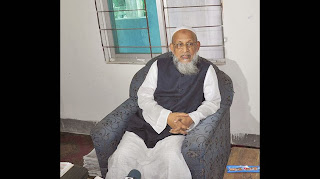Lalkhan Madrasa: A Huji Den
Julfikar Ali Manik
The founder of the Madrasa played a significant role in spreading the network of Huji across the country since early 1990s
An explosion rocked the Lalkhanbazar Madrasa, run by Hefazat-e-Islam leader Mufti Izharul Islam Chowdhury, in the port city of Chittagong Monday morning
 |
| An explosion rocked the Lalkhanbazar Madrasa, run by Hefazat-e-Islam leader Mufti Izharul Islam Chowdhury, in the port city of Chittagong Monday morning |
 |
| Mufti Izharul Islam Chowdhury, founder of Jamiatul Uloom Al Islamia Madrasa Photo- Dhaka Tribune |
Mufti Izharul Islam Chowdhury, founder of Jamiyatul Ulum Al Islamia Madrasa – otherwise known as Lalkhan Bazar Madrasa – played a significant role in spreading the network of the radical outfit across the country since early 1990s with the ultimate goal of launching a jihad.
A source in Chittagong, who has close links with these networks, told the Dhaka Tribune last evening that the madrasa had even trained Huji members in operating arms so they could fight in the battlefield as trained jihadis.
The source also confirmed that Mufti Izhar, founder principal of Lalkhan madrasa, had very close links with Osama Bin Laden and Mollah Omar of the terrorist organisation al-Qaeda. Izhar travelled to Afghanistan on several occasions and met Laden, Omar and many other Taliban leaders.
He has described his trips to Afghanistan and meetings with the Taliban leaders in different publications, which are circulated within the Huji network.
About 70 years old, Mufti Izhar is one of the senior leaders in the Islamist parties in the country. He is the ameer of a faction of the Islami Oikya Jote (IOJ) and also the chairman of a faction of Nezam-e-Islam.
He and his madrasa have close ties with the fundamentalist Islamist outfit Hefazat-e-Islam and its headquarters Hathazari madrasa in Chittagong.
Some Islamist leaders and also the source close to the radical network said Izhar claimed himself as the nayeb-e-ameer (vice-president) of Hefazat, but his rival groups opposed his claim.
Two sons of Izhar are central leaders of Hefazat. None of them could be reached on Monday over phone as their mobile phones were switched off.
Citing local people, the source said Izhar had been available at the madrasa until 5pm, but he had since been missing and his mobile phone was also found switched off.
Izhar was arrested in December 2010 in connection with two criminal cases in Chittagong, but he came out on bail after a few months. The Criminal Investigation Department in Dhaka at that time showed Izhar arrested in a case to investigate his Huji links. A CID official, on condition of anonymity, told the Dhaka Tribune that the investigation had stalled after Izhar had got out on bail.
Huji was launched through a press conference at the National Press Club in the capital in 1992. The press conference was addressed by a group of Bangladeshi Afghan war veterans who had gone to Afghanistan in the 1980s to fight with local Mujaheedins there against the then Soviet occupational force.
Establishing a network based in Qawmi madrasas, Huji carried out a number of terrorist attacks and also planted bombs to kill Awami League chief Sheikh Hasina at Kotalipara, Gopalganj, in 2000 during her first term as the prime minister.
Huji even carried out grenade attacks on an Awami League rally on Bangabandhu Avenue on August 21, 2004 to assassinate Hasina, who narrowly escaped death, but the attacks killed 24 Awami League leaders and activists and maimed 300 others, according to police investigation.
Huji used smuggled Arges grenades, a military weapon, in the attack.
The outfit was banned in October 2005 for its anti-state activities.
After on Monday’s explosion inside Mufti Izhar’s madrasa, a police official in Chittagong confirmed that the grenades had been locally made.
“The explosion occurred when they were making grenades inside the madrasa,” Mohammad Shohidullah, additional deputy commissioner of Chittagong Metropolitan Police, told the Dhaka Tribune over phone.
The multi-storey madrasa was established in a hilly region in Chittagong in 1980, accommodating around 1,500 students and 50 teachers.
After on Monday’s explosions, police officials in Chittagong started investigating Izhar’s involvement with the radical groups home and abroad.
After the countrywide simultaneous blasts of about 500 bombs by another militant outfit – Jama’atul Mujahideen Bangladesh (JMB) – in 2005, the then government had to launch a crackdown on militant outfits. Arms training at Lalkhan madrasa also stopped at that time, police sources said.
After on Monday’s blast, madrasa people and leaders of Islamist parties started propagating that the explosion was caused by a CPU and a UPS of a computer, trying to hide the making of grenades.
Police were raiding the madrasa and arrested nine people including three teachers and four of them were arrested from two private hospitals while undergoing treatment.
The source confirmed that one of them was a diploma engineer from Chittagong Polytechnic Institute and he was providing technical support to make grenades.
Source: http://www.dhakatribune.com/bangladesh/2013/oct/08/lalkhan-madrasa-den-huji
